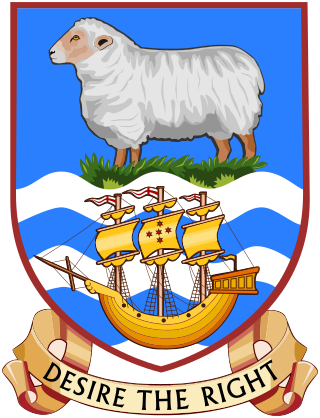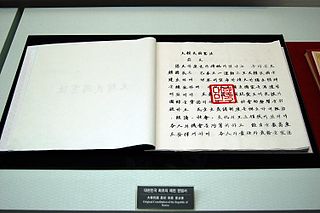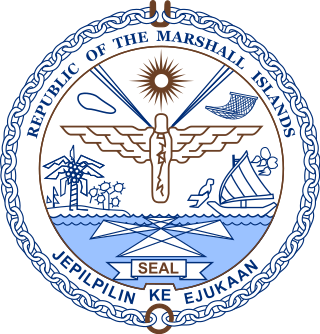
The Government of Barbados (GoB) is a unitary parliamentary republic, where the President of Barbados is the head of state and the Prime Minister of Barbados is the head of government.

The politics of the Falkland Islands takes place in a framework of a constitutional monarchy and parliamentary representative democratic dependency as set out by the constitution, whereby the Governor exercises the duties of head of state in the absence of the monarch, and the Chief Executive is the head of the Civil Service, with an elected Legislative Assembly to propose new laws, national policy, approve finance and hold the executive to account.

Judicial independence is the concept that the judiciary should be independent from the other branches of government. That is, courts should not be subject to improper influence from the other branches of government or from private or partisan interests. Judicial independence is important for the idea of separation of powers.

The government of Italy is that of a democratic republic, established by the Italian constitution in 1948. It consists of legislative, executive, and judicial subdivisions, as well as of a head of state, known as the president.

The Government of India is the national authority of the Republic of India, located in South Asia, consisting of 36 states and union territories. The government is led by the President of India who exercises the most executive power and selects the Prime Minister of India and other Ministers for aid and advice. The country has been legislated by a NDA-led legislature since 2014. The prime minister and their senior ministers belong to the Union Council of Ministers—its executive decision-making committee being the cabinet.

The Constitution of the Republic of Lithuania defines the legal foundation for all laws passed in the Republic of Lithuania. The first constitution of the contemporary republic was enacted on 1 August 1922. The current constitution was adopted in a referendum on 25 October 1992.

The Federal Constitution of Austria is the body of all constitutional law of the Republic of Austria on the federal level. It is split up over many different acts. Its centerpiece is the Federal Constitutional Law (Bundes-Verfassungsgesetz) (B-VG), which includes the most important federal constitutional provisions.

The Government of South Africa, or South African Government, is the national government of the Republic of South Africa, a parliamentary republic with a three-tier system of government and an independent judiciary, operating in a parliamentary system. Legislative authority is held by the Parliament of South Africa. Executive authority is vested in the President of South Africa who is head of state and head of government, and his Cabinet. The President is elected by the Parliament to serve a fixed term.

The Constitution of the Republic of Korea is the supreme law of South Korea. It was promulgated on July 17, 1948, and last revised on October 29, 1987.

The government of the Marshall Islands operates under a mixed parliamentary-presidential system as set forth in its Constitution. Elections are held every four years in universal suffrage, with each of the 24 constituencies electing one or more representatives (senators) to the lower house of RMI's unicameral legislature, the Nitijela. The President, who is head of state as well as head of government, is elected by the 33 senators of the Nitijela. Four of the five Marshallese presidents who have been elected since the Constitution was adopted in 1979 have been traditional paramount chiefs.

Iroij Litokwa Tomeing was the President of the Marshall Islands from January 2008 until October 2009.

The Constitution of Ghana is the supreme law of the Republic of Ghana. It was approved on 28 April 1992 through a national referendum after 92% support. It defines the fundamental political principles, establishing the structure, procedures, powers and duties of the government, structure of the judiciary and legislature, and spells out the fundamental rights and duties of citizens. It is made up of 26 chapters, not including the preamble.

Ruben R. Zackhras was a Marshallese politician. He was acting President of the Marshall Islands from 21 October 2009 to 26 October 2009. He previously served as Minister of Finance from 1992 to 1998.

The Constitution of Samoa is a written constitution which is the supreme law in Samoa. It establishes Samoa as a parliamentary republic with a Westminster system and responsible government. It outlines the structure and powers of the Samoan government's three parts: the executive, legislature, and judiciary.

Iroijlaplap Christopher Jorebon Loeak is a Marshallese politician who was the President of the Marshall Islands from 2012 to 2016. He was elected by parliament as President in January 2012, following the 2011 general election.
The concept of the separation of powers has been applied to the United Kingdom and the nature of its executive, judicial and legislative functions. Historically, the apparent merger of the executive and the legislature, with a powerful Prime Minister drawn from the largest party in parliament and usually with a safe majority, led theorists to contend that the separation of powers is not applicable to the United Kingdom. However, in recent years it does seem to have been adopted as a necessary part of the UK constitution.

The Separation of powers in Singapore is governed by Constitution of the Republic of Singapore, which splits the power to govern the country between three branches of government – the parliament, which makes laws; the executive, which executes them; and the judiciary, which enforces them. Each branch, while wielding legitimate power and being protected from external influences, is subject to a system of checks and balances by the other branches to prevent abuse of power. This Westminster constitutional model was inherited from the British during Singapore's colonial years.

The Provisional Constitution of the Federal Republic of Somalia is the supreme law of Somalia. It provides the legal foundation for the existence of the Federal Republic and source of legal authority. It sets out the rights and duties of its citizens, and defines the structure of government. The Provisional Constitution was adopted on August 1, 2012 by a National Constitutional Assembly in Mogadishu, Banaadir.

The Marshall Islands is a country in the Pacific spread over 29 coral atolls, with 1,156 islands and islets. It has an estimated population of 68,480 and is one of the sixteen member states of the Pacific Islands Forum. Since 1979, the Marshall Islands has been self-governing.
A constitutional referendum was held in the Marshall Islands on 20 November 2023, alongside general elections. Citizens voted on amendments to the constitution proposed by parliament and approved by the convention elected in 2017.
















